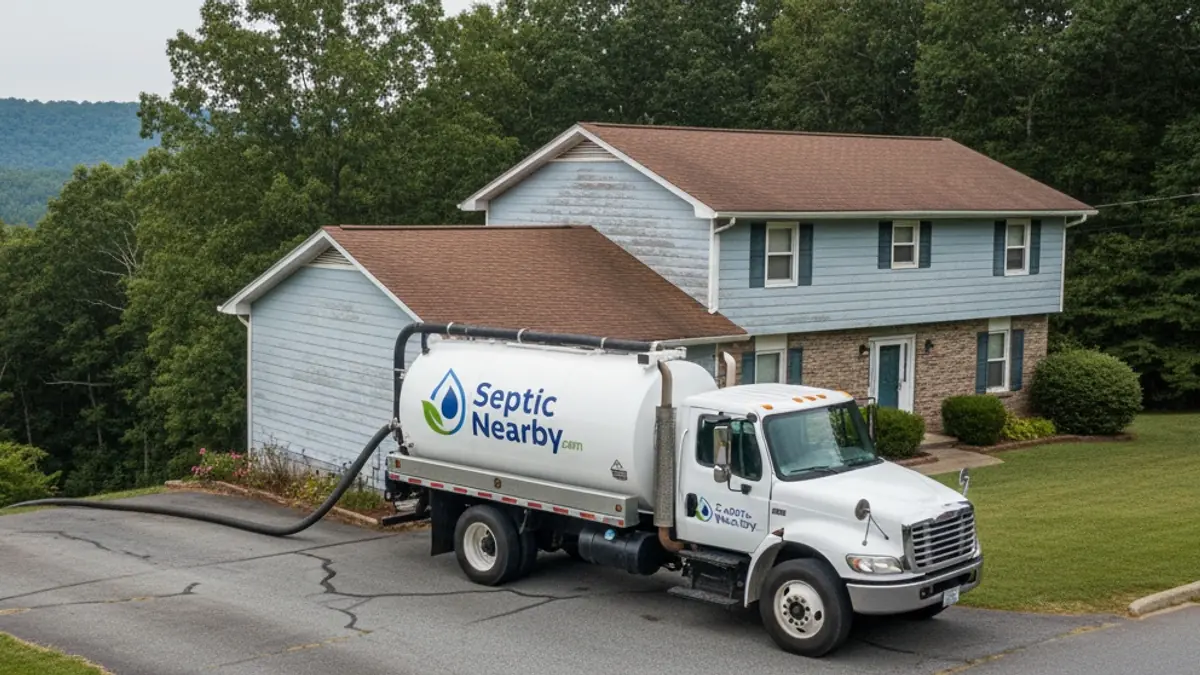Septic Pumping Services in Lumpkin County, GA
 Photo Illustrative
Photo Illustrative+1-470-9-SEPTIC
Operators available 7 AM - 9 PM
Licensed & Insured • No Obligation • Emergency Service Available
Cities We Serve in Lumpkin County
Local Septic System Factors in Lumpkin County
Operational Logistics for Septic System Service in Lumpkin County, GA
Managing septic system health in Lumpkin County is fundamentally a challenge of logistics and equipment readiness. From our dispatch center, servicing this region isn't just about pumping tanks; it's about efficient fleet deployment across a varied and demanding terrain. The operational map of Lumpkin is a mix of clustered subdivisions near Dahlonega and sprawling rural properties deep in the mountains, each presenting unique service requirements that dictate vehicle choice, route planning, and job duration.
Our primary objective is minimizing homeowner downtime and preventing costly system failures through scheduled, preventive maintenance. This begins with sophisticated route optimization. GPS tracking and real-time dispatch allow us to cluster appointments in specific areas, like the communities along the Etowah River or near Auraria, to improve fuel efficiency and reduce travel time between jobs. A call from a remote property off a winding Forest Service road requires a different logistical approach than a routine service in a planned neighborhood. The access road's grade, surface, and turning radius determine which truck in the fleet is dispatched. A standard 4,000-gallon pumper truck might be perfect for a level lot in town, but a smaller, more maneuverable 2,500-gallon vehicle with superior traction is often necessary for the steeper, gravel driveways common throughout the county.
Equipment specifications are critical. Our fleet is maintained to meet strict DOT compliance standards, but local conditions demand more. The acidic, clay-rich soils found in much of Lumpkin can accelerate corrosion on steel tanks and components. Consequently, our preventive maintenance schedules for vehicle undercarriages and tank interiors are more aggressive than in regions with neutral, sandy soils. Hoses, fittings, and pump seals are inspected daily, as the abrasive nature of the local aggregate can cause premature wear. A failed hose on-site is an unacceptable service failure and an environmental risk.
Ultimately, our service delivery is measured by efficiency metrics: on-time arrival rates, jobs-per-truck-per-day, and first-time fix rates. For Lumpkin County homeowners, this operational focus translates into reliable, predictable service. Whether it's a routine pump-out coordinated by a local provider like CleanWorks Septic or an emergency call handled by Peachtree Septic, the underlying principles of fleet management, terrain analysis, and equipment preparedness are what ensure the job is done correctly. Understanding the interplay between the humid subtropical climate, the challenging topography, and the specific soil composition is not just an environmental consideration—it's the core of effective and responsible septic service operations.
Frequently Asked Questions in Lumpkin County
Key septic regulations in Lumpkin?
The primary authority is the Lumpkin County Board of Health, which operates under guidelines from the Georgia Department of Public Health. A permit is mandatory for new installations and significant repairs like replacing a tank or drainfield. Routine pumping to remove accumulated solids is considered maintenance and does not require a permit.
Average pumping cost across Lumpkin?
Costs typically range from $325 to $650. The variation is driven by logistics. A home in a Dahlonega subdivision with easy truck access will be on the lower end. A remote property with a steep, unpaved driveway that requires a specialized truck and extra hose will be on the higher end of the scale. Tank size is also a primary factor.
How often to pump septic systems in the county?
The standard recommendation is every 3 to 5 years. However, in Lumpkin County, this can change. Systems in areas with dense clay loam soil and high water tables may need more frequent pumping (closer to 3 years) to prevent drainfield stress. Larger households or homes with garbage disposals should also adhere to a shorter cycle.
Weather and scheduling in Lumpkin?
The heavy rain seasons of late winter and spring can saturate the ground, making it difficult for heavy pumper trucks to access tanks without damaging your property. The optimal window for scheduling routine septic maintenance is during the drier months of late summer and fall (August through November).